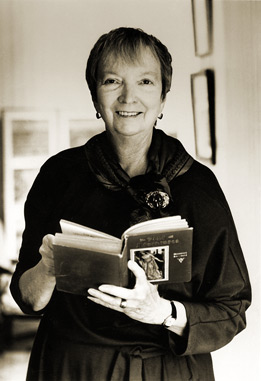
Elizabeth Bishop was an American poet and short-story writer. She was Consultant in Poetry to the Library of Congress from 1949 to 1950, the Pulitzer Prize winner for Poetry in 1956, the National Book Award winner in 1970, and the recipient of the Neustadt International Prize for Literature in 1976. Dwight Garner argued in 2018 that she was perhaps "the most purely gifted poet of the 20th century". She was also a painter, and her poetry is noted for its careful attention to detail; Ernest Hilbert wrote “Bishop’s poetics is one distinguished by tranquil observation, craft-like accuracy, care for the small things of the world, a miniaturist’s discretion and attention."

Madeleine L'Engle was an American writer of fiction, non-fiction, poetry, and young adult fiction, including A Wrinkle in Time and its sequels: A Wind in the Door, A Swiftly Tilting Planet, Many Waters, and An Acceptable Time. Her works reflect both her Christian faith and her strong interest in modern science.

Farrar, Straus and Giroux (FSG) is an American book publishing company, founded in 1946 by Roger Williams Straus Jr. and John C. Farrar. FSG is known for publishing literary books, and its authors have won numerous awards, including Pulitzer Prizes, National Book Awards, and Nobel Prizes. As of 2016 the publisher is a division of Macmillan, whose parent company is the German publishing conglomerate Holtzbrinck Publishing Group.

Alice McDermott is an American writer and university professor. For her 1998 novel Charming Billy she won an American Book Award and the U.S. National Book Award for Fiction. She was shortlisted for the PEN/Faulkner Award for fiction.

David Grossman is an Israeli author. His books have been translated into more than 30 languages.
Olga Horak is a Czechoslovakian-born Australian author and Holocaust survivor.
Fania Fénelon was a French pianist, composer and cabaret singer whose 1976 memoir, Sursis pour l'orchestre, about survival in the Women's Orchestra of Auschwitz during the Holocaust was adapted as the 1980 television film, Playing for Time.

Janet McDonald was an American writer of young adult novels as well as the author of Project Girl, a memoir about her early life in Brooklyn's Farragut Houses and struggle to achieve an Ivy League education. Her best known children's book is Spellbound, which tells the story of a teenaged mother who wins a spelling competition and a college scholarship. The book was named as one of the American Library Association's eighty-four Best Books for Young Adults in 2002.
Fern Schumer Chapman is a journalist and author best known for her autobiographical book Motherland: Beyond the Holocaust - A Mother-Daughter Journey to Reclaim the Past. Her second book, Is It Night or Day?, was released in 2010. She is also the author of a blog, Half-life: A blog about immigration, loss and legacy.

"A Good Man Is Hard to Find" is a Southern gothic short story first published in 1953 by author Flannery O'Connor who, in her own words, described it as "the story of a family of six which, on its way driving to Florida [from Georgia], is slaughtered by an escaped convict who calls himself the Misfit".
Brenda A. Ferber is an author of children's literature. She is an alumna of the University of Michigan. She won the Sydney Taylor Manuscript Award for her book Julia's Kitchen before it was published, and the Sydney Taylor Book Award following publication.

Noémi Ban was a Hungarian-born American Jew and survivor of the Holocaust. Later in life she was a Golden Apple Award-winning lecturer, public speaker, and teacher residing in Whatcom County, Washington.

Phillip M. Hoose is an American writer of books, essays, stories, songs, and articles. His first published works were written for adults, but he turned his attention to children and young adults to keep up with his daughters. His work has been well received and honored more than once by the children's literature community. He won the Boston Globe–Horn Book Award, Nonfiction, for The Race to Save the Lord God Bird (2004), and the National Book Award, Young People's Literature, for Claudette Colvin (2009).

Crewel is a 2012 young adult dystopian fantasy novel by Gennifer Albin. The book is Albin's debut novel and is the first entry in her Crewel World trilogy. Crewel was released on October 16, 2012, by Farrar, Straus and Giroux and follows a young girl in a dystopian society that is pulled from her family due to her ability as a Spinster to manipulate the world via weaving. Albin stated that she came up with the idea of using the term "Spinsters" while comparing the term for old maids with that of the usage of the term to describe someone who spins wool. The following book in the series, Altered, was released on October 29, 2013.
Gabi Swiatkowska is a Polish-born artist, musician, and children's author and illustrator. She has shown up twice on the ALA Notable Book Award list. One of the books that she illustrated, My Name Is Yoon, won the Ezra Jack Keats Award and is on the New York Public Library's list of 100 Great Children's Books
Hetty Esther Verolme is an Australian writer, educator and Holocaust survivor. She now lives in Australia. She has written about her experiences as a child in Bergen-Belsen, and is a founding trustee of Children of Belsen and the Holocaust Trust.
Margot Cecile Heumann was a German-born American Holocaust survivor. As a lesbian, she was the first queer Jewish woman known to have survived Nazi concentration camps.

Lily Ebert is a Hungarian-born British writer and Holocaust survivor, who in recent years has become notable for her memoir and social media videos and media appearances documenting her life as a survivor of that campaign.
Chetna Maroo is a British Indian author. Her debut novel, Western Lane, was shortlisted for the 2023 Booker Prize.











